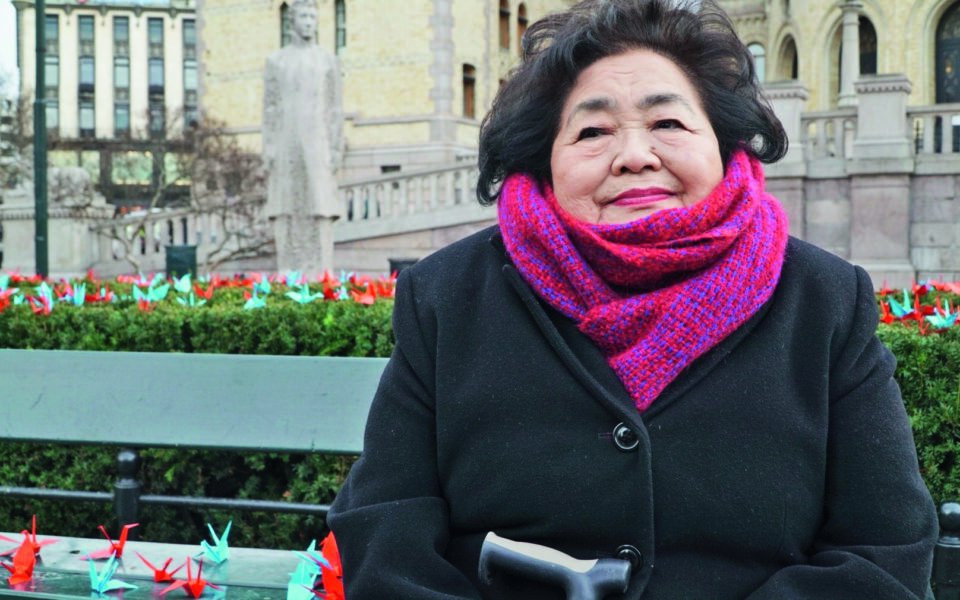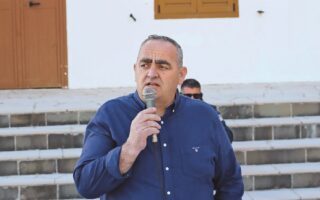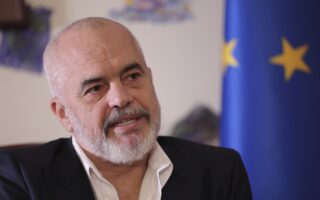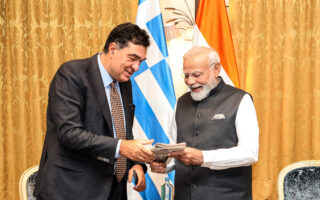‘It was a procession of ghosts’
Hiroshima survivor talks to Kathimerini about her experience when the atomic bomb was dropped

In Japanese culture, the term Hibakusha (“bomb survivor”) describes the civilians who survived the destruction when atomic bombs were dropped on Hiroshima and Nagasaki. Seventy-eight years later, in light of the film “Oppenheimer,” about the mastermind of the Manhattan Project who succeeded in building the bombs, the memory of the devastation in Japanese cities has come rushing back. This devastation and its consequences are described to Kathimerini by Setsuko Thurlow, one of the last survivors of Hiroshima, who has devoted herself to the fight against nuclear weapons. Thurlow is one of the protagonists of the International Campaign to Abolish Nuclear Weapons (ICAN), which was awarded the 2017 Nobel Peace Prize, with the Japanese-Canadian woman delivering a speech at the award ceremony.
It was 8.15 a.m. on August 6, 1945, when Hiroshima was targeted with an enriched uranium gun-type fission weapon dubbed “Little Boy.” The 13-year-old Setsuko was 1.8 kilometers from the blast at the Imperial Army headquarters.
“At the time of the bombing, I was a 13-year-old grade 8 student. In those days we did not have regular classroom instruction. We were mobilized by the army to do the job for them. I was selected to be a member of a 30-person group sent to the army headquarters to deal with secret messages. For three weeks we learned how to deal with that. And on that very day, August 6, 1945 we were sent to the headquarters. It was Monday morning at 8 o’clock. We got to the military headquarters, which was 1 mile away from the hypocenter and we started the assembly. The major who was in charge of us students gave us the pep talk. ‘You girls,’ he said, ‘you learn the job. This is the day you prove your patriotism. You show your loyalty to the emperor.’ We said, ‘Yes, sir, we will do our best.’ And at that second, I saw the bluish-white flash in the window. Then I remember the sensation of flying up in the air. And then floating up in the air. And that is the end of my recollection.
“When I regained consciousness, it was total silence and darkness around me. I knew I was facing death because I could not move my body. I was pinned under the collapsed building. Then I started hearing faint voices of my classmates who were in the same room. ‘Mother, help me,’ ‘God help me.’ Then all of a sudden somebody shook my left shoulder from behind and a male voice said: ‘Do not give up, keep pushing, keep moving. You see the sound coming through that opening? Move towards it. Go towards it as quickly as possible.’ In the darkness. I could not see this man’s face. I followed his instructions and I got out of the collapsed building.
“By that time, it was on fire already. I looked back, trying to see if I could do something to help the other girls. But there was nothing I could do. It was burning. Two girls came out and joined me. That meant most of the other girls in the group, about 30 of them, were burnt to death alive.
“Although it was supposed to be 8 o’clock in the morning, by the time I came out, it was dark like twilight, perhaps because of all the particles in the air, soot and smoke rising up in the mushroom cloud. Now, I began to see some moving dark objects coming close to me. It was a procession of ghosts. I say ‘ghosts’ because they did not look like human beings. Their hair was standing up, while their faces were burned, blackened and swollen. They were shuffling slowly. Their skin and flesh were hanging from their bones. And some were carrying their eyeballs out of their eyes. And as they collapsed their bellies burst open and intestines spread out. By then, we had learned how to step over the dead bodies. We joined the procession and escaped through the nearby army training ground.
“By the time we got there, the place was packed with dead bodies and seriously injured people. Nobody was screaming or shouting for help. They just did not have that kind of physical and psychological strength. They simply begged in a faint voice, ‘Water, please,’ ‘Water, please give me water.’ But of course there were no cups and no containers to carry the water. And we, the three girls, went to the nearby stream. We washed off the blood from our bodies and we tore our blouses, soaked them in the water and took them to the dying people, putting the wet cloth over their mouths so they could suck out the moisture. I quickly looked around to see if there were any doctors or nurses helping them. No, not a single one. After all, about 80% of those people were killed themselves. And those who survived must have been helping the injured and dying people in some other places. We continued helping them all day. And when darkness fell, we sat on the hill and watched all night the entire city burning. Actually, in a stunned way. We just could not respond emotionally in the appropriate way.
“The next day we learned that at the time of the bombing there were in the city center about 7,000 to 8,000 grade 7 and grade 8 students from all the high schools. Most of my schoolmates were there, cleaning the fire lane. The temperature rose to 4,000 degrees Celsius. They were simply vaporized and incinerated. My own sister-in-law was there, my cousin was there, as well as my sister with her 4-year-old child who visited us from out of town the night before. They were on their way to the doctor at 8 o’clock in the morning on that day. They were walking over the bridge in the center of the city. They had no chance. By the time I saw them the next day, I could not recognize them as they were just burned, blackened and swollen. They were really transformed into chunks of burnt flesh. [Later] a soldier dug a hole in the ground, threw in the bodies, and poured in the gasoline. That was a kind of cremation. There was no dignity or anything.
“Then, about a week later, my uncle and aunt were feeling very sick. But they did not have any external evidence of injury, but somehow, they were exposed to radiation. You cannot see radiation. You cannot smell it; you cannot taste it. But somehow their bodies were affected. My mother looked after them until their death and she reported that inside their bodies their internal organs seemed to be melting, and a thick, black liquid was coming out. After several days, they died.
At that second, I saw the bluish-white flash in the window. Then I remember the sensation of flying up in the air. And then floating up in the air
“Due to the radiation exposure, some people died immediately, others a week, later even, after months or years. About 10 years after the bombing, it was the time which showed the peak in the number of people who suffered from the effects of radiation, while, 78 years later, people are still dying as a result of that. On the day of the explosion, I lost nine members of my family, while the city had lost 140,000 people by the end of 1945.”
Even today the leading countries compete and intimidate each other based on the nuclear threat. From North Korea to the US and Russia. What is your view on the nuclear threat?
Even after the end of the occupation of Japan, the United States kept on developing for years their nuclear program. Later, the Soviet Union joined and initiated their program. At that time, only three bombs existed. Today, nine states possess 13,000 nuclear warheads. So, our suspicion was right – Hiroshima and Nagasaki were just the beginning.
We, the survivors of Hiroshima and Nagasaki, painfully learned that as long as a nuclear weapon exists, there is no guarantee of safety and security. The only way to have security is by getting rid of all the nuclear weapons. This is the conclusion we have reached, and we felt the moral responsibility to share this conviction with the rest of the world. And that is what we have been doing these past 78 years. We have been talking all around the world. But nuclear-armed states obviously have not learned. They do not seem to be interested in getting rid of what they have.
Are you afraid of something might happen again?
Of course, as long as we have nuclear weapons available, even if there is no intention of using them, they are always a big opportunity for an accident. And there have been many occasions where there was a near-miss kind of accident. But somehow, those people who believe in nuclear weapons think they are useful for deterrence. On the contrary, we are saying, “No, let’s get rid of them.” Half a year after Hiroshima, and Nagasaki, the world came together and started talking about eliminating all nuclear weapons. And the United Nations’ very first resolution was about what to do to get rid of nuclear weapons. That was in 1946. How many years have passed? And the “Non-Proliferation Treaty” that came into force in 1968 has not been productive. The nuclear weapon states have the legal obligation to work toward the disarmament but they have not done a thing.
In 2021 the new United Nations treaty came into force. It is the “Treaty on the Prohibition of Nuclear Weapons,” which was sabotaged by the nuclear weapon states because that treaty demands the prohibition of all nuclear weapons. Those nations are not fulfilling the obligation of Article 6 of the “Non-Proliferation Treaty.”
Seventy-eight years after the atomic bombing of Hiroshima and Nagasaki, Hollywood tried to portray the events through the movie “Oppenheimer.” The stigma of the past is viewed in theaters. What should young people remember and how can we transmit the “Never again” message?
I have to say that I am happy to have this opportunity to be talking with my Greek friends. I have been to your fascinating country a few times and I have very good memories of Greece. Also, I am aware that about 60% of your cities have adopted the provisions of the ICAN campaign (“International Campaign to Abolish Nuclear Weapons”). That is fascinating. Congratulations! You are hard-working people for peace.
I should mention that in my native country of Japan and my adopted country of Canada, the majority of people are saying, “We won the abolition of nuclear weapons.” But the governments are not listening. Supposedly, we live in democratic nations, but they are not responding to the will of the people. Therefore, if we really believe in democracy, the governments should be paying more attention to the desires of the people. What I learned through the bombing of Hiroshima and Nagasaki it is the preciousness of each and every human life, the sacredness of human life. When we are born, we are given the tremendous gift of life. Let’s protect our lives, let’s rejoice, and enjoy every bit of our life.





